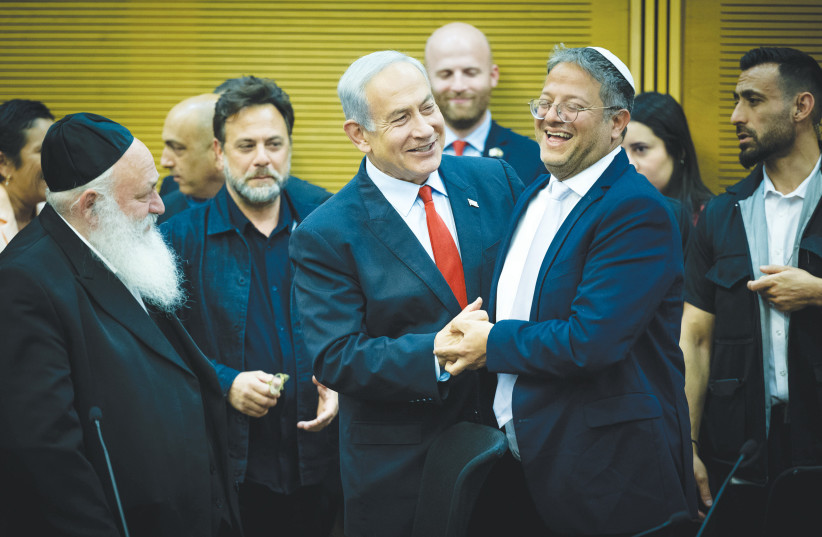Sixty-eight percent of voters – 62% from the coalition parties and 80% from the opposition parties – prefer some sort of compromise on the judicial reform legislation being pushed by the government, according to a new report from the Israel Democracy Institute.
The data comes two weeks after the coalition passed the Law to Cancel the Reasonableness Clause by a vote of 64-0, with all members of the opposition abstaining in protest.
The pollsters found that 72% of coalition voters support the reform, while 91% of opposition voters oppose it.
What do voters think about a possible Israeli unity government?
A majority of coalition supporters said their leadership was doing a good job, while a majority of opposition supporters said their leadership was doing a poor job. This may be due to the perceived success of the coalition in passing legislation despite nationwide protests and the perceived failure of the opposition to prevent it.
IDI’s new data, which polled 615 men and women in Hebrew and 150 in Arabic, touched on rumors and sentiments that circulated about a week ago that Prime Minister Benjamin Netanyahu would ditch his coalition partners and for an emergency unity government with opposition leader Yair Lapid (Yesh Atid) and National Unity chairman Benny Gantz.

Of the respondents, 46% said they were against Netanyahu dropping Finance Minister Bezalel Smotrich’s Religious Zionist Party and National Security Minister Itamar Ben-Gvir’s Otzma Yehudit Party to form the unity government, while 39% said they were in favor.
Thoughts on police action against protests and the judicial reform
The same trend was seen in how voters viewed the police response to the protests against the judicial reform, now in their 32nd week. Forty-two percent of the respondents said the police had acted poorly, and they have been criticized from both sides of the political aisle over their handling of the protests.
Those on the Right have decried what they see as a double standard, when compared with police actions against demonstrators prior to the Disengagement from the Gaza Strip in 2005. Those on the Left cited incidents throughout the current anti-government protests that have resulted in injuries and arrests.
Additionally, 64.5% of the respondents said they believed the government would continue full steam ahead with the reform legislation after the Knesset’s current break, which ends in mid-October, which likely means the protests will continue past Rosh Hashanah.
A minority (38%) of respondents were optimistic about both the future of democracy and security in the country, while 36% said they were not.
The fear factor regarding security was likely due to an increasing number of IDF reservists who said they would stop volunteering for duty due to the legislation. Netanyahu and IDF Chief of Staff Lt.-Gen. Herzi Halevi have continued to reassure Israelis that the IDF is ready for any fight.
The poll asked voters about how the striking reservists should be handled. The mixed results had 28% calling for them to be kept in service but handed disciplinary actions, while 28% wanted just disciplinary action, and 21% called for their removal.
In terms of the long-term economic fallout, the respondents were split. The individuals behind the polling, Prof. Tamar Herman and Dr. Or Inabi, said in their report: “Although many findings prove and even deepen the polarization in the positions of the two main blocs – the voters of the coalition parties and the voters of the opposition parties – at the same time, one can also find restraining factors. For example, the majority on both sides prefers finding a compromise on [judicial reform], as well as the non-exacerbating attitude, including on the Right, regarding volunteer reservists who do not show up when they are called to duty.”
